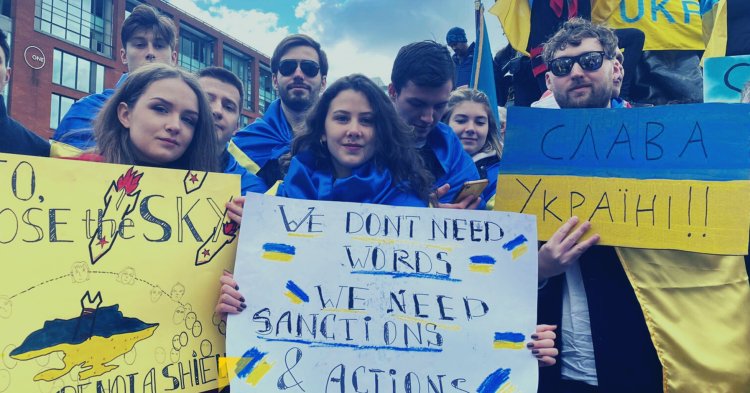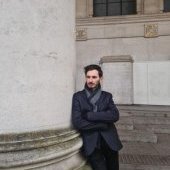Soon a month will have passed since the Russian government began an illegal invasion of a sovereign democracy. Ukraine, a country rarely mentioned in western media, has become a symbol for freedom across Europe, and the continent has been united more than ever before in its condemnation of war. While many Eastern Europeans have links to the embattled country, the largest in the region, the Ukrainian diaspora in Western Europe also has a long and rich history which should not be forgotten.The United Kingdom’s Ukrainian community first arrived in the 19th century, with one of its biggest and oldest hubs being right here in Manchester.
Today we meet Mariia, Natalia and Sasha, a few of the motivated young Ukrainians who, in the face of this crisis, came together to create the University of Manchester’s very own Ukrainian Society. Together with our local JEF branch, the UoM Students’ Union and a plethora of motivated volunteers, they launched a campaign to collect donations for refugees in Poland and raise funds for the charity ‘British-Ukrainian Aid’.
TNF: Thank you very much for your time! In the past weeks we have seen many students with no prior experience with activism start campaigns and organise events in support of Ukraine. What has been your experience with this sudden dive into political activism?
Natalia: Nothing prepares you for a war starting in your country. Over the first few days, it was an extreme shock initially which then turned into a feeling of wanting to help as much as possible. All Ukraininas that I met during the first couple of protests shared exactly the same feeling of wanting to do something but unsure with regards to where to start. Therefore, as a first step, we came up with the idea of starting the Ukrainian Society which would act as a central point of all queries and donations being collected. Very shortly afterwards, we’ve had people reach out from multiple societies to ask how they can help and what are the best ways to volunteer. This in turn flourished into collaboration between so many people that shared the same cause.
Sasha: As you have put it, the experience is quite sudden. When the war first started on the 24th of February, I was honestly quite shocked; however, as the shock subsided over the following days and I was sure my extended family was relatively safe, my thoughts turned to finding ways to help fellow Ukrainians. Personally, right now I see three main categories of Ukrainians that need help the most: those who have fled the country, those who are staying in Ukraine, and lastly, those actively defending Ukraine. Moreover, with regards to political activism, I see it as a tool that can be used to spread information and further my goal of helping my countrymen; when they need it the most.
Mariia: Even though what has happened was not completely unpredictable, the 24th of February still took everybody by surprise. Even though it was at first hard to realise what was happening was real, people of Manchester reacted immediately. Due to the lack of time the organisation process was at first quite hectic but the willingness to unite, support each other and, most importantly, Ukraine made it possible to take action quickly. Volunteering activities and the launch of the campaign were also supported by people of other nationalities, representatives of the SU, etc., to whom I am personally extremely grateful.
TNF: Campaigning is never easy, no matter the cause. What has been the biggest challenge you have faced so far?
Natalia: Learning and creating the campaign and donation points in such a short period of time. Since the war broke out suddenly, we had to act fast as well. We were overwhelmed with queries coming from people asking for the ways in which they can help. It was challenging to organise all that into one united action, which would give everyone an opportunity to help. The guidance around the processes from already formed societies, such as the Bulgarian and Polish societies, has helped a lot. Also, the Students’ Union treating this as a priority and helping with speeding up the processes helped ease the pressure.
Sasha: I think we have been fairly fortunate in the fact that we didn’t have to face a lot of the challenges a traditional campaign would. For example, we were able to establish ourselves as a recognised Ukrainian Society in the University of Manchester fairly easily and promptly, thanks in large part to the help provided to us by the Students’ Union team. I think the biggest challenge we have faced has been trying to organise ourselves, and find ways in which we can help.
Mariia: The process of launching the campaign as well as the establishment of the new Ukrainian students’ society was facilitated by help and support of Student union and committee members of other societies. However, I personally think that the most challenging part was the promotion of the campaign since we had started from scratch and no one had heard about the society until last month.
TNF: We have seen young people from across Europe stand in solidarity with Ukraine. Has this been the case in the UK?
Natalia: Absolutely. We’ve had a lot of support from most of the Societies at the UoM and also we had a lot of students wanting to volunteer. As we used Instagram as our main platform for advertisement of the events, fundraising and donation points - we had a lot of queries coming from the general public as well. The most active support was received from Eastern European students, as most have connections to Ukraine in one way or another.
Sasha: From what I’ve seen in the past 3 weeks is that there has been a lot of activity amongst the youth in the UK. That being said, a lot of it has been organised by young Ukrainians like ourselves, fellow eastern Europeans, and people with Ukrainian heritage. To be fair, this is fairly understandable given that the people I mentioned previously would be most affected by the ongoing war.
Mariia: Judging from my own experience, there has been noticeable support coming from youth in the UK. However, it is worth mentioning that the projects and campaigns were mainly led by students coming from Eastern Europe since they are more aware of the origins of the war and the history of Ukraine itself.
TNF: Do you believe the UK and the EU have done enough to help Ukrainians like yourselves? What more should be done?
Natalia: The greatest help that I can receive is knowing that my family is safe in Ukraine or knowing that they can come to the UK if the situation escalates even further. WIth complex Visa requirements that were changing daily, it was unclear how the UK government was enabling us to reunite with our families. However, the recent military support is very appreciated and it would be crucial to see that continuing to happen. FInally, it is very possible that Ukrainian students will need more support in the future when it comes to covering tuition fees, as their families are no longer able to support themselves due to the war.
Sasha: Personally, I don’t feel like people like myself need a lot of help, there are plenty of others that need it way more than I do. However, for other Ukrainians living in the UK, I’m sure that they would appreciate the possibility of bringing their family members to the UK to live with them, as is the case in most of the EU countries. In regards to overall support for Ukraine, I think the response has been great and I am very grateful for that. However, I feel like there is more that can be done both in terms of military and humanitarian assistance.
Mariia: I believe that until the war comes to an end there always will be more to be done. Amongst the actions that can be taken I would like to mention the humanitarian aid, facilitation of visa application process, as well as addressing the problem of financial difficulties that students in Europe may face.
TNF: What’s one message you would like to send Europe’s youth during this crisis?
Natalia: Remember that we are united by one goal and that is peace for humans. This stretches beyond borders, cultures or languages. This is about being human and protecting the most fundamental thing - a peaceful life for every one of us.
Sasha: A message to the youth? As you have seen, despite differences across the European community, there is still a lot to agree on; don’t lose track of the common goals and don’t allow divisions to fester due to minor differences. War is an indescribably horrendous thing, but it brings people together in a way few things can, it united the Ukrainian people, and hopefully, it will unite Europe as well. Slava Ukraini.
Mariia: Stay up to date. Speak up. Take action.


Follow the comments: |
|
